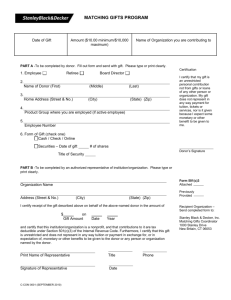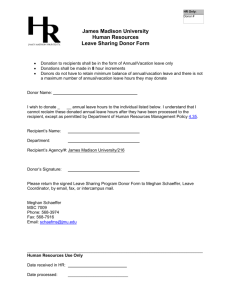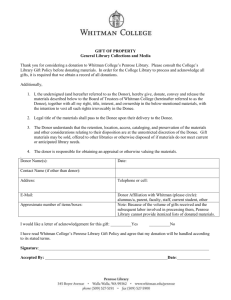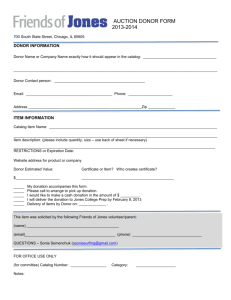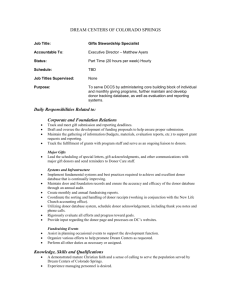WORD
advertisement
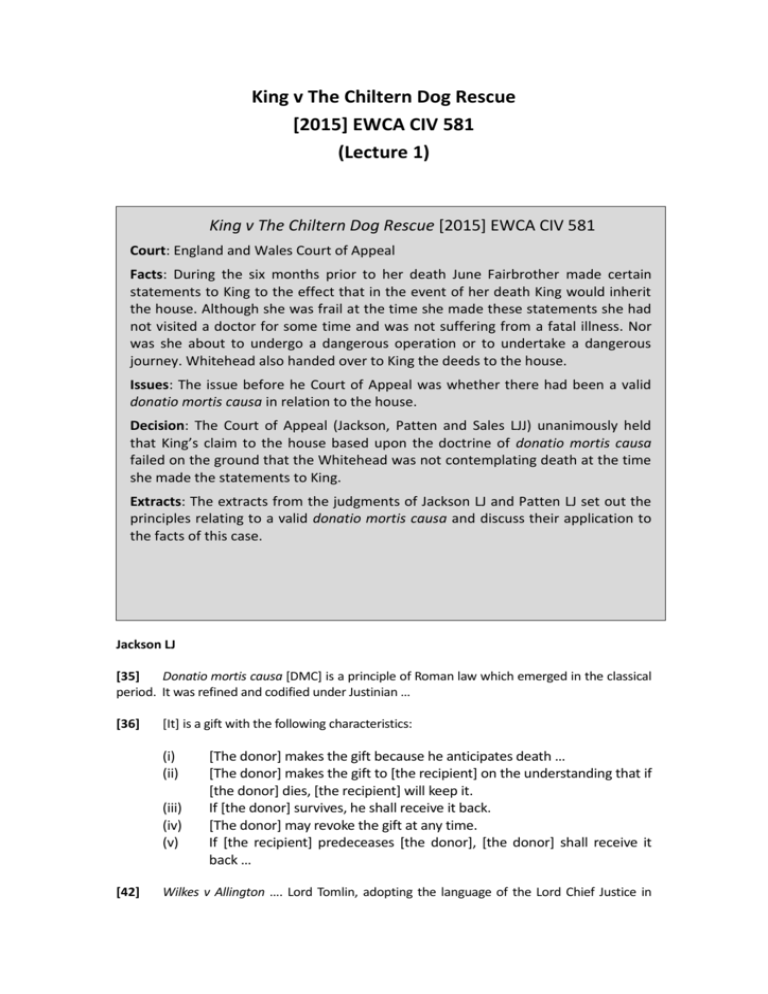
King v The Chiltern Dog Rescue [2015] EWCA CIV 581 (Lecture 1) King v The Chiltern Dog Rescue [2015] EWCA CIV 581 Court: England and Wales Court of Appeal Facts: During the six months prior to her death June Fairbrother made certain statements to King to the effect that in the event of her death King would inherit the house. Although she was frail at the time she made these statements she had not visited a doctor for some time and was not suffering from a fatal illness. Nor was she about to undergo a dangerous operation or to undertake a dangerous journey. Whitehead also handed over to King the deeds to the house. Issues: The issue before he Court of Appeal was whether there had been a valid donatio mortis causa in relation to the house. Decision: The Court of Appeal (Jackson, Patten and Sales LJJ) unanimously held that King’s claim to the house based upon the doctrine of donatio mortis causa failed on the ground that the Whitehead was not contemplating death at the time she made the statements to King. Extracts: The extracts from the judgments of Jackson LJ and Patten LJ set out the principles relating to a valid donatio mortis causa and discuss their application to the facts of this case. Jackson LJ [35] Donatio mortis causa [DMC] is a principle of Roman law which emerged in the classical period. It was refined and codified under Justinian … [36] [It] is a gift with the following characteristics: (i) (ii) (iii) (iv) (v) [42] [The donor] makes the gift because he anticipates death … [The donor] makes the gift to [the recipient] on the understanding that if [the donor] dies, [the recipient] will keep it. If [the donor] survives, he shall receive it back. [The donor] may revoke the gift at any time. If [the recipient] predeceases [the donor], [the donor] shall receive it back … Wilkes v Allington …. Lord Tomlin, adopting the language of the Lord Chief Justice in Cain v Moon,1 set out the requirements of a DMC as follows: For an effectual donatio mortis causa three things must combine: first, the gift or donation must have been in contemplation, though not necessarily in expectation of death; secondly, there must have been delivery to the donee of the subject-matter of the gift: and thirdly, the gift must be made under such circumstances as to show that the thing is to revert to the donor in case he should recover2 … [45] [In Birch v Treasury Solicitor] Lord Evershed made an important statement as to the limits of the doctrine: Because of these peculiar characteristics the courts will examine any case of alleged donatio mortis causa and reject it if in truth what is alleged as a donatio is an attempt to make a nuncupative will, or a will in other respects not complying with the forms required by the Wills Act3 … [47] [In Sen v Headley4] Nourse LJ, delivering the judgment of the [Court of Appeal], noted that DMC was an anomaly in English law for two reasons. First, it was immune to the Statute of Frauds 1677 and the Wills Act 1837. Secondly, it was an exception to the rule that there was no equity to perfect an imperfect gift … [50] It is clear that there are three requirements to constitute a valid DMC. They are: (i) (ii) (iii) [The donor] contemplates his impending death. [The donor] makes a gift which will only take effect if and when his contemplated death occurs. Until then [the donor] has the right to revoke the gift. [The donor] delivers dominion over the subject matter of the gift to [the recipient]. [51] As many judges have observed, the doctrine of DMC in the context of English law is an anomaly. It enables D to transfer property upon his death without complying with any of the formalities of section 9 of the Wills Act or section 52 of the Law of Property Act. Thus the doctrine paves the way for all of the abuses which those statutes are intended to prevent. [52] The Lord Chancellor in Jones v Selby5 and Lord Chelmsford in Cosnahan [v Grice] 6 drew attention to this risk. They stressed the need for the strictest scrutiny of the factual evidence. The Court of Appeal rightly stressed in Birch that the courts must not allow DMC to be used as a device in order to validate ineffective wills. [53] I see much force in all of these observations. Indeed I must confess to some mystification as to why the common law has adopted the doctrine of DMC at all. The doctrine obviously served a useful purpose in the social conditions prevailing under the later Roman Empire. But it serves little useful purpose today, save possibly as a means of validating death bed gifts. Even then considerable caution is required. What [the donor] says to those who are ministering to him in the last hours of his/her life may be a less reliable expression of his/her [1896] 2 QB 283 at 286. Wilkes v Allington [1931] 2 Ch 104 at 109. 3 Birch v Treasury Solicitor [1951] 1 Ch 298 at 307-8. 4 [1991] Ch. 425. 5 (1710) 24 ER 143. 6 Cosnahan v Grice (1862) 15 ER 475. 1 2 wishes than a carefully drawn will. The will may have been prepared with the assistance of a solicitor and in the absence of the beneficiaries. There are no such safeguards during a deathbed conversation. The words contained in a will are there for all to see. There may be much scope for disagreement about what [the donor] said to those visiting or caring for him in the last hours of his life. [54] In my view therefore it is important to keep DMC within its proper bounds. The court should resist the temptation to extend the doctrine to an ever wider range of situations. [55] Let me now consider what those proper bounds are. The first requirement is that [the donor] should be contemplating his impending death. That means [the donor] should be contemplating death in the near future for a specific reason ... I do not say that DMC is only available when [the donor] is on his deathbed, even though that is the situation in which the doctrine might be said to serve a useful social purpose (provided that no-one is taking advantage of [the donor’s] dire situation). Nevertheless it is clear on the authorities that [the donor] must have good reason to anticipate death in the near future from an identified cause. It is also clear on the authorities that the death which [the donor] is anticipating need not be inevitable. The illness or event which [the donor] faces can be one which [the donor] may survive … [57] It is an essential feature of DMC … that the gift lapses if [the donor] recovers or survives. Obviously [the donor] will die at some later date, but the DMC does not run on until that happens. It comes to an end if [the donor] fails to succumb to the death which was anticipated when he made the DMC. [58] I turn now to the second requirement. This is that [the donor] should make an unusual form of gift. It will only take effect if his contemplated death occurs. [The donor] reserves the right to revoke the gift at will. In any event the gift will lapse automatically if [the donor] does not die soon enough … In cases where early death is inevitable the law relaxes the requirement that [the donor] should specifically require the property back if he survives … [59] I turn now to the third requirement. This is that [the donor] should deliver ‘dominion’ over the subject matter. Since property will not pass until a future date (if ever) and [the donor] has the right to recover the property whenever he chooses, it is not easy to understand what ‘dominion’ actually means. I take comfort from the fact that even chancery lawyers find the concept difficult … From a review of the cases I conclude that ‘dominion’ means physical possession of (a) the subject matter or (b) some means of accessing the subject matter (such as the key to a box) or (c) documents evidencing entitlement to possession of the subject matter. [60] Let me now draw the threads together. The doctrine of DMC is only applicable if the three requirements set out above are met. Because the doctrine is open to abuse, courts should require strict proof of compliance with those requirements. The courts should not permit any further expansion of the doctrine. Patten LJ [90] The paramount principle established by the earlier authorities is that the law’s recognition of a DMC as a valid means of transferring property on death operates as an exception rather than an alternative to the requirements of the Wills Act or any other statutory provisions governing the valid transmission of interests in property. The requirement that a will must be signed by the testator in the presence of two witnesses is intended to provide protection for the testator and his estate against abuse. They are not therefore unnecessary formalities. The testator's execution of the will and his capacity to make it can be proved objectively by those who witnessed it being done. By contrast, the making of a DMC, as in this case, will usually occur privately between the donor and the donee in circumstances where the potential for fabrication and invention by the donee is high and the prospect of disproving an alleged DMC correspondingly low. [91] This provides the obvious justification for two well-established principles. The first is that the court will require clear and unequivocal evidence of the gift and will subject that evidence to the strictest scrutiny. The second is that the only circumstances in which the law will permit such a gift to take effect is when it is made in contemplation of death. That means impending death within the near future. Not the mere possibility that it may occur at some future date weeks or even months away.7 [92] In Sen v Headley8 the donor was in hospital on his deathbed and died three days after making the gift. In Re Craven's Estate,9 death occurred five days after the gift and in Birch v Treasury Solicitor,10 four days after the gift. In the present case, Mr King’s evidence was that the gift was made four to six months before death on 10 April 2011 at a time when Mrs Fairbrother was still fit enough to go and collect the deeds to the house from the bank. Her alleged contemplation of death is not based on anything she said or did other than the words ‘This will be yours when I go’ and the way she is supposed to have looked at Mr King when she said it. [93] In my view, that evidence, even if credible, comes nowhere near to satisfying the requirement that the gift should be made in contemplation of death. It does not demonstrate that Mrs Fairbrother thought that her death was impending, let alone imminent. Re Craven’s Estate [1937] 1 Ch 423 at 426. [1991] Ch 425. 9 [1937] 1 Ch 423. 10 [1951] Ch 298. 7 8

